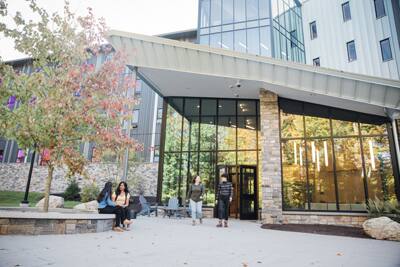Bachelor of Science in Computer Information Systems New England campus experience

Program Overview Why get a computer information systems degree on campus?
Use technology to drive effective business strategies with a Bachelor of Science (BS) in Computer Information Systems (CIS) from Southern New Hampshire University. As a CIS student, you'll develop a deep understanding of the technology behind successful organizations, positioning yourself to analyze and recommend improvements. This foundation can help you bridge the gap between technology and users for future employers, contributing to both the technical and interpersonal aspects of the workplace.
Skills you'll learn:
- Business intelligence applications to analyze data models
- Communication strategies for IT-business collaboration
- Systems analysis, design and project management
- Information systems tools and technologies
- Fundamentals of organization theory
- Decision-making, teamwork and leadership

Courses & Curriculum Power up with on-campus computer information systems courses
In the CIS program, you'll explore key tech concepts like systems thinking, scripting, database environments, application development, and object-oriented analysis and design. You'll approach these concepts from a business perspective with courses on client systems, enterprise information systems and business intelligence. Along the way, you’ll get hands-on experience, applying your skills in real-world scenarios and taking on practical challenges in a final capstone project that lets you showcase your problem-solving abilities.
Interested in learning in an online environment? This same curriculum is offered through SNHU's online computer information systems degree.
Campus computer information systems degree concentrations
Looking to specialize your degree? SNHU offers 1 concentration for the BS in CIS degree.
During a time when data has quickly gone from a scarce resource to an abundant one, statistical tools are rapidly evolving. The Bachelor of Science (BS) in Computer Information Systems with a concentration in Statistical Modeling will help you learn the skills necessary to build and interpret statistical models drawing from real-world examples in the age of big data, data science and data analytics.
Learn from instructors with industry experience
Our faculty bring with them decades of knowledge and experience in technology, which informs the development of SNHU’s courses and curriculum. They look forward to supporting your journey both in the classroom and as you work toward a career in your field.
Lundy Lewis
Position
Professor, Computer Information Systems
Joined SNHU
2003
Education
- PhD with a Logic and Artificial Intelligence focus from the University of Georgia
- MS in Computer Science from Rensselaer Polytechnic Institute
- BS in Mathematics and BA in Philosophy with a minor in Computer Science from the University of South Carolina
Dr. Lundy Lewis is an expert in computer networking, cyber security, artificial intelligence and robotics. A researcher for the U.S. Department of Defense, he brings 15 years of industry experience to the classroom. Lewis holds 37 U.S. patents and has published 3 books on telecommunications management. He's also received research grants from the U.S., Canada and Australia.
Elizabeth Henley
Position
Professor, Computer Information Systems | Chair, Management Science and Information Systems
Joined SNHU
2002
Education
- EdD from Walden University
- MEd in Elementary Education, BA in English Language and Literature, and BA in Arts and Humanities from Southern New Hampshire University
Before transitioning to her current role, Dr. Elizabeth Henley held various positions at SNHU, including disability specialist and associate director of assistive technology. She currently serves on multiple committees at the university, including the Center for Teaching and Learning and the Assessment Alliance. Henley is certified in elementary (K-8) and special education (K-12), and her research focuses on assistive technology for students. She's also a member of the New England Association on Higher Education and Disability (NE AHEAD).
To learn more about SNHU faculty, visit our campus faculty page.
Campus major courses
You’ll take major courses that provide you with a solid foundation in your area of study – in some cases featuring experiential or project-based learning opportunities, labs, simulations and internships. These courses will allow you to learn a wide variety of topics and help prepare you for a role in your desired field.
Courses may include:
Visit the course catalog to view the full BS in Computer Information Systems curriculum.
Campus general education courses
All undergraduate students are required to take general education courses, which are part of SNHU's newly redesigned program, The Commons. The goal of The Commons' curriculum is to empower you with some of the most in-demand skills, so you can succeed not only in your academic career, but in your personal and professional life too.
Courses may include:
Can’t wait? You don’t have to!
Apply now if you’re ready, and have your decision within 30 days. Or, schedule a visit and come see us in person!
Career Outlook What can I do with a computer information systems degree?
Lightning-fast access to information is no longer a "nice to have" – it's essential for any business to thrive. That's where a well-educated workforce comes in. With a CIS degree, you'll be prepared for a number of careers that bring business and technology together.
CIS is vital across industries, so you'll have many options to choose from. In banking and finance, for example, account management systems host massive databases of sensitive client information. In manufacturing, information systems can improve supply chains by connecting manufacturers with their customers, suppliers, service providers and more. And that's just scratching the surface of how CIS powers businesses across sectors.
Career paths include:
- Computer systems analyst
- Computer and information systems manager
- Information technologist
- Project manager
Openings projected yearly, on average, by the U.S. Bureau of Labor Statistics (BLS) for computer systems analysts through 2033.1
Median annual wage for computer systems analysts as of May 2023, according to BLS.1
Understanding the numbers
When reviewing job growth and salary information, it’s important to remember that actual numbers can vary due to many different factors—like years of experience in the role, industry of employment, geographic location, worker skill and economic conditions. Cited projections do not guarantee actual salary or job growth.

Campus Student Experience So, what's it like taking classes on campus?
In this program, you'll have the chance to explore new artificial intelligence tools and put them to use in streamlining processes. You might present your work locally at Undergraduate Research Day – or across the country at national conferences. You could even have the opportunity to collaborate with companies to analyze data and find unique solutions and system recommendations.

Student support
At SNHU, you don’t have to do this college thing alone. You’ll have help from your advisor, access to tutoring and office hours, career coaching, and mental health services so you can do your best and feel your best.
Additionally, our Office of Diversity and Campus Accessibility Center make campus a safe place for everyone. Visit our Student Services page to learn more about our support offerings.

Small class sizes
With an average class size of 15-25 (depending on your major) you’ll learn in an environment where professors with real world experience know you by name.
Here, you’re not getting lost in giant lecture halls, but instead, actively participating in thoughtful dialogue where you’re always encouraged to collaborate with your peers and ask questions when they arise.

State-of-the-art facilities
Our 300-acre campus has everything you need. From technology-advanced classroom settings to your dorms complete with fitness centers and hangout spots, our goal is to give you the best college experience possible.
Whether you’re learning in a classroom, in a lab, on the field, or in your field, you’ll have what you need to be successful from the moment you wake up to the moment you close your textbooks.
School of Business Learn about the School of Business
In the School of Business, you’ll tackle real-world business challenges with the help of your experienced professors. From interning with local sports teams to learning the ins and outs of starting your own business, you can hone your skills through peer collaboration, case studies and participating in business competitions. Whether you’re focusing on an organization’s finances, marketing, technology or leadership, you’ll get firsthand experience from day one.
Business simulations
Sales immersion lab
Pitch competitions
How SNHU makes college affordable
At Southern New Hampshire University, we're on a mission to make high-quality education more accessible with more affordable tuition. With 70+ career-focused majors, state-of-the-art facilities, D2 sports and over 70 student clubs and organizations, you can get the campus experience you've always dreamed of at a more affordable price.
Fill out the FAFSA to see if you’re eligible for grants or work-study. (You could also be offered loans, though you’ll have to pay those back later.)
Transfer up to 90 credits toward your bachelor's degree program at SNHU. If you’ve taken one course or many, we’ll evaluate them for you.
Getting free money for college – from SNHU or an outside organization – could help you save hundreds or even thousands of dollars.
Hear from us

Computer information systems is a great program for students who have technical aptitude and are interested and working with technology, but also want to work with people.
Elizabeth Henley, Professor, Computer Information Systems | Chair, Management Science and Information Systems
Accreditations
SNHU is accredited by the regional accreditor the New England Commission of Higher Education (NECHE). The university also carries specialized accreditations for some programs.
This program and its concentrations are accredited by the Accreditation Council for Business Schools and Programs (ACBSP). Student achievement data can be found on the ACBSP accreditation page.


Sources & Citations
1Bureau of Labor Statistics, U.S. Department of Labor, Occupational Outlook Handbook, on the internet, at https://www.bls.gov/ooh/computer-and-information-technology/computer-systems-analysts.htm (viewed Sept. 30, 2024). Cited projections may not reflect local and/or short-term economic or job conditions and do not guarantee actual job growth.
Your dream school is waiting
Apply now or schedule a visit today.








